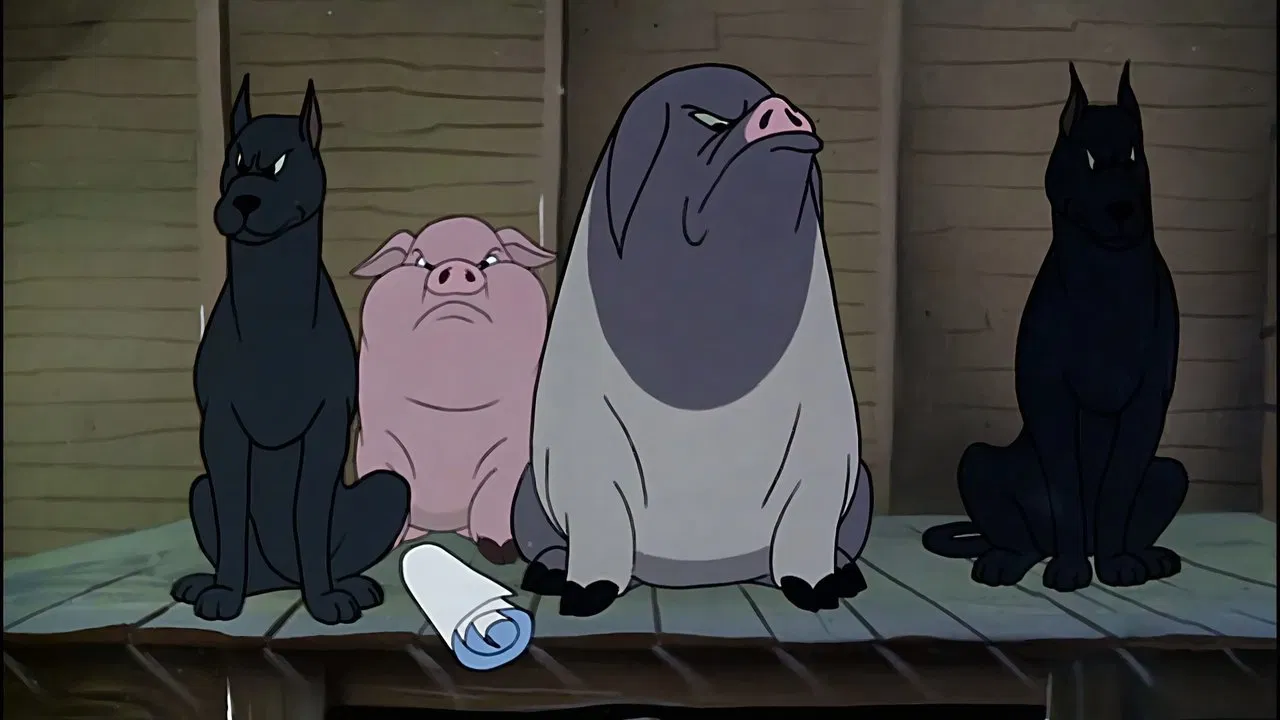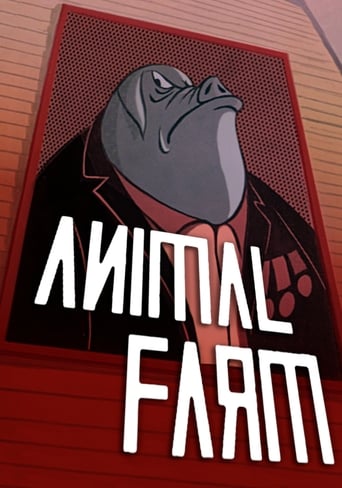NekoHomey
Purely Joyful Movie!
ChicRawIdol
A brilliant film that helped define a genre
Anoushka Slater
While it doesn't offer any answers, it both thrills and makes you think.
Ezmae Chang
This is a small, humorous movie in some ways, but it has a huge heart. What a nice experience.
Edgar Soberon Torchia
It took me the long route to learn that this animation was conceived as a propaganda film, sponsored by the US Office of Policy Coordination, which was under the direction of the Department of State and Defence and housed by the CIA. I was curious that the film credited a "Joseph Bryan III" as screenwriter, while his name was omitted in many reliable sources, and instead Philip Stapp was credited. I began searching for Bryan and his bio seemed too military-inclined to link his name to a film project... But then I found Tony Shaw's book "Hollywood's Cold War" where he tells the whole story. Bryan was hired by OPC to create the Psychological Warfare Workhop, an "unorthodox unit, made up almost entirely of Princeton alumni" to devise "unconventional schemes to undermine the solidarity of the emerging Eastern bloc and to sharpen the Americans' anti-communist publicity techniques". How the rights of the book were sold to Louis de Rochemont, how he was connected to the OPC and how this unit financed the film, amount to a fascinating tale of espionage. Then I found out that the whole story is told In Wikipedia, although not with all the details Shaw provides. This story will most probably have little or no effect on your feelings about the movie, but it helps to understand why so many changes were made to Orwell's original and why the list of screenwriters is so long (and possibly longer). As for the directors John Halas and Joy Batchelor it is claimed that they knew nothing about nothing, just as Leni Riefentahl knew nothing about the Nazis. In any case here it is just for the record.
GusF
While its comparatively happy ending lacks the power and sheer bleakness of the novel's ending, it is nevertheless a wonderful satire of totalitarianism in general and the Soviet Union in particular and an excellent film on its own merits. Maurice Denham is phenomenal as every single character in the film and Gordon Heath's often sardonic tone of voice as narrator is very enjoyable. Seeing the film as a child was my first exposure to George Orwell's work and one of my earliest exposures to satire in any form. Of course, when I was seven / eight, the social commentary and historical parallels went well over my head but it's one of the many influences which helped to shape my political views. I think that it's the only the film that I loved as a child and love as an adult but for (more or less) completely different reasons.
callum-schofield
After reading the book, I found this interpretation disappointing to say the least. For example, the animal's singing of "Beasts if England" is disturbing, and Old Major's Death is exceptionally inaccurate. Why, for example, did the producers move the Battle of the Cowshed, representing the Russian Civil War, where the communists reds fought the capitalist whites, to the start of the film! I believe that this was exceptionally close minded of the producers.As my final point, I believe Orwell would turn in his grave upon seeing the historical inaccuracy of the ending. Did he not write the film to warn the public of the dangers of communism, ignorance and apathy! Therefore, I conclude that the film adaptation is disappointing, inaccurate, and lacking in the morale that is so prevalent in the book,
david-sarkies
This is an animated film based upon the book by George Orwell about a group of animals who revolt against the owner of the farm, throw him out, and then set up their own commune, complete with a constitution. This is one of those books that I never expected there to be a film made of it, however they have, and this particular one, despite the upbeat ending, is quite a good adaptation. Most of the film is narrated, though there are the occasional spoken parts, but they are very minor. It appears that the filmmakers have attempted to retain the nature of the animals.A number of people have suggested that this is an allegorical look at the Russian revolution and the establishment of the Soviet state. They have even suggested that a number of the characters in the novel are similar to persons within the Soviet hierarchy, and then generally point to Sunshine being Trotsky and Napoleon being Stalin. However I am inclined to disagree.The reason for this is that I have a feeling that there is a double allegory here. The reason I say that is because while the reader, who is versed in early 20th Century history, is going to immediately think Soviet Russia, when he reads the book, I have a feeling that Orwell was looking even further back when writing this novel. I do not think that he was writing about one particular revolution, but revolutions in general, and how in many, if not all cases, they end up going full circle. Russia is a prime example of this, which is why we keep on thinking of Russia when reading this book. The second revolution of 1917 installed the Bolshevik government, and after a period of war where the capitalists attempted to, but failed, to overthrow the Bolshevik government, the new rulers set about establishing a communist paradise. However that failed, and after Lenin's death, Stalin maneuvered himself into a position of power, and then proceeded to eliminate his rivals. Thus, but 1929 Stalin was in complete control of the country and Russia had returned to an autocratic state.However, I would also point to over revolutions, not just the Chinese revolution which installed a communist government in China, but also the American and French revolutions. The reason I say that is because there is a clear focus on a constitution in this book, and when I think of constitutions, I immediately think of the American Bill of Rights and the French Declaration of the Rights of Man. I will focus on the French revolution here.I do not think it is any accident that Orwell chose Napoleon to be the name of the antagonist in his story. In one way it represents Stalin, but in another way it represents his namesake, Emperor Napoleon of France. I do not believe Napoleon was anywhere near as much of a butcher as Stalin, but his autocratic rule in France is a clear indicator of what Orwell was on about. The French aristocracy was overthrown and executed. Then the allies of the aristocracy declared war against France. As a result, a government was formed to fight the war, and due to this war this new, democratically elected government became ever more autocratic. However, they were overthrown in 1795, and replaced by a more moderate government, which then resulted in the rise of Napoleon, who claimed the title of Emperor of France in 1801.I could go on to the American system, but I do not believe I have enough space to continue. I guess what Orwell is demonstrating here is that revolutions do not necessarily ever turn out the way we want them to, and in the end, all that happens is that one autocratic government is replaced by a new autocratic government. However, I still got the feeling that Napoleon (in the film) reminded me a lot of Winston Churchill.

